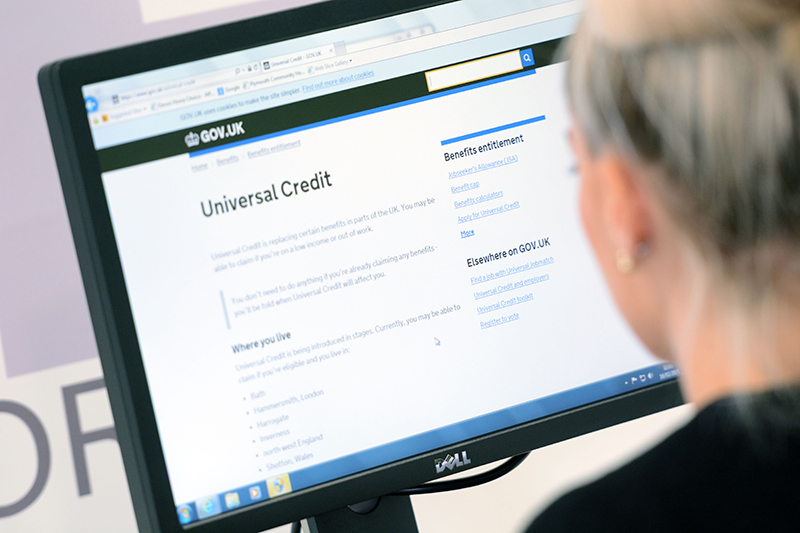Budget: Calls for Universal Credit uplift to be made permanent
A temporary £20 uplift to Universal Credit announced by Chancellor Rishi Sunak said in his Budget speech yesterday must be made permanent, campaigners have urged.

Mr Sunak said that the benefit uplift to mitigate the impact of coronavirus on household finances, which was due to end on March 31, will remain in place until September.
He added that working tax credit claimants would receive equivalent support over the next six months through a one-off payment of £500.
Introduced in March 2020 as a measure to help people whose income was hit by the COVID-19 crisis, the £20-per-week Universal Credit increase has allowed many households to keep their heads above water whilst the economic impact of COVID-19 has continued.
However, as a result of the benefits freeze between 2016 and 2019, Universal Credit has fallen in value over a tenth (11.5%) behind inflation. The uplift is the only year Universal Credit has risen at or above inflation rates since its introduction eight years ago, in 2013.
The Scottish Federation of Housing Associations (SFHA) making the uplift permanent will support those worst affected by the ongoing pandemic.
Sally Thomas, SFHA chief executive, said: “While we welcome the £20-a-week uplift in Universal Credit payments being extended, the UK Government should have taken the opportunity today to make it permanent. The uplift has helped to provide vital extra support to people worst affected to the pandemic, and, with the effects of Covid likely to be felt for some time to come, it’s critical that they’re not faced with the prospect of losing it again in six months’ time. It is also particularly concerning that the uplift ends at the same time as the furlough scheme as this could result in further financial hardship. SFHA will continue to campaign for the uplift to be made permanent.”
Ms Thomas added: “With the Chancellor confirming that Scotland will receive an additional £1.2 billion via the Barnett formula, we will await the final stages of the Scottish Budget next week to see if this results in any further funding for affordable housing.”
Citizens Advice Scotland (CAS) also expressed disappointment that the Chancellor failed to make the uplift permanent.
Nina Ballantyne, CAS spokesperson, said: “Universal Credit wasn’t enough to live on before the pandemic, and if the uplift ends, whether now or in six months, it will be worth less in real terms than it was when it was first introduced in 2013. If the uplift is removed in October, people on UC face a cash income drop of as much as a quarter.
“Strengthening our social security safety net and in turn our overall economy – rather than weakening it through continued uncertainty – should be the priority of government.
“The cost of extending the uplift is a drop in the ocean compared to the pressure that will be placed on other public services when it’s cut.
“Delaying the final decision on the uplift has once again left people without financial security when they need it most.”
Airdrie & Shotts MP Neil Gray has criticised the Chancellor’s Budget for failing those who most desperately need greater support.
Mr Gray said: “This was a dereliction of the responsibility Rishi Sunak has to those who most desperately need support during these incredibly difficult times.
“There were a number of glaring omissions from Rishi Sunak’s budget today such as the reluctance to give those struggling on legacy benefits the uplift given to Universal Credit claimants and the lack of funding for the Excluded UK workforce.
“Cross party MPs and a range of expert charities representing social security recipients have called for the £20 per week uplift to be made permanent and extended to legacy benefits. I have been vocal in helping lead that campaign so I am incredibly disappointed that the Chancellor cynically chose to extend the uplift Universal Credit by six months - enough to get him through the upcoming elections, but merely delaying the poverty inducing cliff edge to come.
“This was the ideal time for Rishi Sunak to show that the UK Government really has the needs of the general public at the heart of its working and sadly he has failed.
“Short-time gain for long time austerity seems to be his mantra.”
Scottish Greens co-leader and finance spokesperson, Patrick Harvie, added: “Rishi Sunak had no choice today but to invest in a recovery, but there is no leadership when it comes to the climate emergency.
“Across the world countries are investing serious public money into a green recovery, in things like renewable energy, public transport and warm homes. That’s not what we’ve seen today.
“While I welcome that furlough and the £20 universal credit uplift have been extended, a fair recovery depends on more permanent solutions. Keeping the corporation tax at the lowest rate in the G7 isn’t a good start.
“It would be unthinkable to return to an economy which relied on poor wages and insecure incomes, and that allowed far too many people to fall through the holes in the social security safety net.
“The Scottish Government has an opportunity to use any extra consequentials coming to Scotland to invest in that fairer, greener economy. We have been clear that this must prioritise low wages and rising poverty.”







